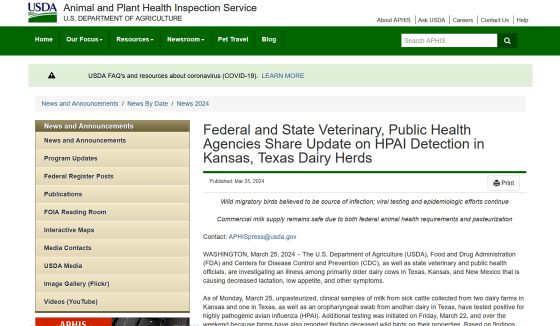The world's first ``case of a dairy cow being infected with avian influenza'' is reported in the United States, even a milk sample before sterilization has a positive result

Since 2021, the spread of
USDA APHIS | Federal and State Veterinary, Public Health Agencies Share Update on HPAI Detection in Kansas, Texas Dairy Herds
https://www.aphis.usda.gov/aphis/newsroom/news/sa_by_date/sa-2024/hpai-cattle

Dairy cattle in Texas, Kansas test positive for bird flu | AP News
https://apnews.com/article/bird-flu-dairy-cattle-usda-kansas-texas-c3040bb31a9a8293717d47362f006902
In world 1st, dairy cows in Texas and Kansas test positive for H5N1 bird flu | Live Science
https://www.livescience.com/health/flu/in-world-1st-dairy-cows-in-texas-and-kansas-test-positive-for-h5n1-bird-flu
Bird Flu Spreads to Dairy Cows - The New York Times
https://www.nytimes.com/2024/03/25/science/bird-flu-cows-milk.html
The U.S. Department of Agriculture, Food and Drug Administration, Centers for Disease Control and Prevention, as well as state veterinarians and public health officials, are reporting that in Kansas, Texas, and New Mexico, primarily older dairy cows are suffering from decreased appetite, fever, and a sharp decline in milk production. We have conducted research on diseases that exhibit symptoms.
According to Texas Department of Agriculture Secretary Sid Miller, an outbreak of a 'mysterious dairy cow disease' began about three weeks ago. The cows became lethargic and had no appetite, and their milk production suddenly decreased, Miller said. ``I had never seen anything like this before. It was as if the cows had caught a cold.'' I am.
And on March 25, 2024, the U.S. Department of Agriculture released unpasteurized milk samples taken from sick cows at two dairy farms in Kansas and one dairy farm in Texas, and from another dairy cow in Texas. We reported that the collected oropharyngeal swab samples tested positive for highly pathogenic avian influenza. This is believed to be the world's first case of highly pathogenic avian influenza infecting cattle.
On March 22nd, there was a report that a dead wild bird was found on the premises of the farm, and an additional investigation was conducted. According to a Texas study, highly pathogenic avian influenza is likely introduced by wild birds.
Furthermore, on March 20, five days before this case was reported, a case of goats infected with highly pathogenic avian influenza was reported in Minnesota. In response to the first case of highly pathogenic avian influenza infection in goats in the United States, Brian Hoefs, executive director of the Minnesota Animal Health Commission, said, ``On farms where multiple species of animals are raised, the virus may spread to other animals.'' This highlights the possibility of infection in animals.'

Highly pathogenic avian influenza is said to affect about 10% of herds, but sick dairy cows recover naturally in about 7 to 10 days, and there are few or no reports of dairy cows dying. I was told that there is no.
The U.S. Department of Agriculture said dairy farms are required to only provide milk from healthy animals, and affected milk is discarded. In addition, because bacteria and viruses in milk are inactivated by pasteurization before shipment, there is no concern that highly pathogenic avian influenza infection of dairy cows poses a risk to the safety of the milk supply or the health of consumers. I explained.
Initial testing by the National Veterinary Services Laboratory has not found any mutations that would make the virus more transmissible to humans. 'There's no need to panic just yet,' said Dr. Stacey Schultz-Cherry, an influenza expert at St. Jude Children's Research Hospital. 'The cluster of cases appears to be a spillover from contact with infected wild birds.' commented.
However, the fact that the virus has spread to cattle, which are not a species susceptible to avian influenza, is a worrying sign. 'We need to better understand how prevalent this disease is in cattle,' said Richard Webby , a virologist at St. Jude Children's Research Hospital.
Related Posts:







